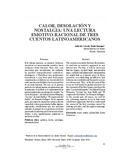Mostrar el registro sencillo del ítem
Calor, desolación y nostalgia: una lectura emotivo-racional de tres cuentos latinoamericanos
| dc.rights.license | http://creativecommons.org/licenses/by-nc-sa/3.0/ve/ | |
| dc.contributor.author | Andrade C., Ender E. | |
| dc.date.accessioned | 2011-12-13T21:38:57Z | |
| dc.date.available | 2011-12-13T21:38:57Z | |
| dc.date.issued | 2011-12-13T21:38:57Z | |
| dc.identifier.issn | 0798-1570 | es_VE |
| dc.identifier.uri | http://www.saber.ula.ve/handle/123456789/34272 | |
| dc.description.abstract | Este trabajo procura, en primera instancia, incentivar un acercamiento emotivo hacia cualquier texto literario. Para ello, será necesario que soslayemos, de entrada, las posibles interpretaciones simbólicas, ideológicas y filosóficas que pudiéramos encontrarle a una obra para dedicarnos simplemente a establecer un vínculo afectivo entre nuestra sensibilidad y la esencia poética de un texto literario. Por eso, en la primera parte de este trabajo apenas nos guiaremos por la intuición, el disfrute y el comentario de la primera impresión causada por los cuentos “La siesta del martes”, de Gabriel García Márquez; “Luvina”, de Juan Rulfo y “El crepúsculo del diablo”, de Rómulo Gallegos. En la segunda parte, por supuesto, dejaremos actuar a nuestra capacidad crítica para intentar hallar algunos argumentos satisfactorios que nos permitan entender el porqué de esa primera sensación provocada en nosotros por la lectura de dichos relatos, y qué signifi caciones implícitas se perciben en ellos. | es_VE |
| dc.language.iso | es | es_VE |
| dc.rights | info:eu-repo/semantics/openAccess | |
| dc.subject | Palabra | es_VE |
| dc.subject | Lector | es_VE |
| dc.subject | Nostalgia | es_VE |
| dc.subject | Latinoamericano | es_VE |
| dc.title | Calor, desolación y nostalgia: una lectura emotivo-racional de tres cuentos latinoamericanos | es_VE |
| dc.title.alternative | Heat, desolation and nostalgia: a rational emotive reading of three Latin American stories | es_VE |
| dc.type | info:eu-repo/semantics/article | |
| dc.description.abstract1 | The current essay looks forward, for instance, to motivate an emotive apporach to any literary text. For this, it will be necessary that we bypass, by fi rst hand, any possible logic, symbolic and philosophic interpretation we might fi nd in a literary piece to focus ourselves in establishing an affective link between our sensibility and the poetic essence in a literary text. Thus, in the fi rst part of this essay we will barely be guided ourselves by the comment of the fi rst impression from the tales “La siesta del martes”, by Gabriel García Márquez; “Luvina” by Juan Rulfo and “El crepúsculo del diablo” by Rómulo Gallegos. In the second part, of course, we will let our criticizing capacity to try to fi nd some satisfactory arguments that let us understand the reason of the fi rst sensation caused by reading such tales, and the implicit meanings perceived in them. | es_VE |
| dc.description.colacion | 41-49 | es_VE |
| dc.description.email | enderandrade@hotmail.com | es_VE |
| dc.identifier.depositolegal | PP92-0047 | es_VE |
| dc.subject.centroinvestigacion | Centro de Investigaciones Literarias y Lingüísticas Mario Briceño Iragorry | es_VE |
| dc.subject.facultad | Núcleo Rafael Rangel (NURR) | es_VE |
| dc.subject.keywords | Word | es_VE |
| dc.subject.keywords | Reader | es_VE |
| dc.subject.keywords | Melancholy | es_VE |
| dc.subject.keywords | Latin American | es_VE |
| dc.subject.publicacionelectronica | Revista Cifra Nueva | es_VE |
| dc.subject.seccion | Revista Cifra Nueva: Artículos | es_VE |
| dc.subject.thematiccategory | Artes y Humanidades | es_VE |
| dc.subject.tipo | Revistas | es_VE |
| dc.type.media | Texto | es_VE |
Ficheros en el ítem
Este ítem aparece en la(s) siguiente(s) colección(ones)
-
Cifra Nueva - Nº 023
Enero - Junio 2011


